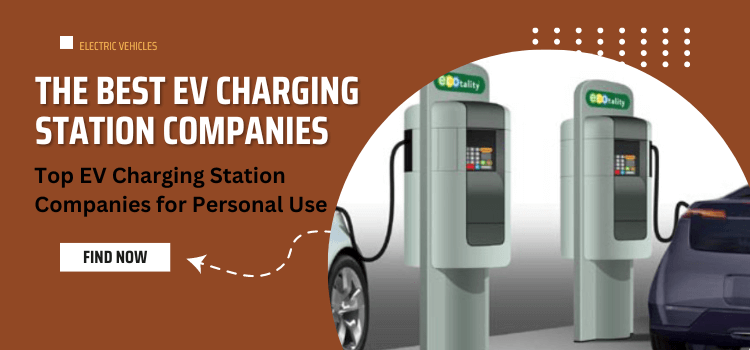The increasing popularity of electric vehicles (EVs) has led to a corresponding rise in the demand for EV charging stations. While many manufacturers offer their own charging solutions, there are also third-party companies that specialize in providing EV charging infrastructure. These companies offer a range of options for personal and commercial use, including Level 2 and DC fast charging stations, as well as innovative technologies to improve the user experience.

In this article, we will explore the best EV charging station companies on the market today. We will examine the features and benefits of their products, compare their commercial offerings, and look at how they are innovating to stay ahead in a rapidly evolving industry. Whether you are an individual looking for a home charger or a business owner seeking to install charging stations for your customers or employees, this guide will provide valuable insights into the top players in the field.
Level 2 vs. DC Fast Charging: Which One is Right for You?
The decision to choose between Level 2 and DC fast charging for EV charging stations is a crucial one that requires an objective evaluation of the specific needs, usage patterns, and infrastructure available. Level 2 charging is the most common type of electric vehicle charging station, providing up to 25 miles of range per hour of charge time. These chargers require a dedicated 240-volt circuit and are ideal for home or workplace use where vehicles are parked for several hours at a time. Residential options for Level 2 chargers include plug-in models that can be installed by homeowners themselves or hardwired units that require professional installation.
On the other hand, DC fast charging (also known as level 3) offers much faster charging times, allowing drivers to recharge their batteries in as little as 30 minutes. However, these stations come with higher costs due to their complex technology and require more power than Level 2 chargers. As such, they are typically found along major highways and at public locations such as shopping centers or airports. Pricing comparison between these two types of EV chargers varies depending on factors including location, electricity rates, and demand charges imposed by utility companies. Ultimately, choosing between Level 2 and DC fast charging depends on individual requirements such as driving habits, distance traveled per day or week/months/yearly basis among others.
Top EV Charging Station Companies for Personal Use
For personal use, there are several noteworthy businesses that provide accessible and convenient charging solutions for electric vehicles. One such company is ChargePoint, which offers a range of smart charging solutions for EV owners. Their home installation options allow customers to easily charge their vehicles at home, with the option to monitor charging progress and schedule charges through a mobile app. Additionally, ChargePoint has an extensive network of public charging stations across the United States and Europe, making it easy for EV drivers to charge while on-the-go.
Another top contender in the EV charging station market is Tesla. While their Superchargers are primarily designed for Tesla vehicle owners, they do offer Level 2 chargers that can be used by all EV models. Tesla’s wall connector allows for quick and efficient charging at home or work, with customizable power settings to fit individual needs. In addition to their own proprietary charging solutions, Tesla also partners with other companies to expand accessibility to its customers through a roaming agreement with ChargePoint. Overall, both ChargePoint and Tesla offer reliable and convenient options for personal use EV charging stations.
Commercial EV Charging Solutions: A Comparison of the Best Companies
When considering commercial EV charging solutions, it is important to compare the various options available from different providers in order to make an informed decision that meets the unique needs of your business. One of the primary factors to consider is EV charging station pricing. The cost of installation and maintenance can vary significantly depending on the provider and type of system selected. It is essential to evaluate these costs carefully, as they can have a significant impact on overall profitability.
Another crucial aspect when selecting a commercial EV charging solution is installation options. Some providers offer turnkey solutions that include everything from site assessment to equipment installation, while others require businesses to hire their own contractors for installation services. Additionally, it is essential to determine whether networked charging stations are required or not. Networked systems offer several benefits such as remote management capabilities and real-time data monitoring, enabling businesses to better track usage patterns and optimize charging resources more efficiently. Ultimately, by comparing these key factors among top providers in the industry, businesses can select a reliable and cost-effective solution that supports their long-term goals for sustainability and profitability.
Innovations in EV Charging Technology: What the Top Companies are Doing to Stay Ahead
Innovations in electric vehicle charging technology have become a key focus for industry leaders as they strive to stay ahead of the competition and meet the evolving needs of customers. One such innovation is wireless charging, which eliminates the need for physical cables and allows vehicles to charge simply by parking over a designated pad or mat. This technology has been developed by companies such as Qualcomm and WiTricity and is currently being tested in various locations around the world.
Another area of innovation is smart grid integration, which enables EV charging stations to communicate with the power grid and adjust their energy consumption according to demand. This means that charging stations can optimize their use of renewable energy sources, reduce peak-time energy consumption, and even generate revenue by selling excess energy back to the grid. Companies like ChargePoint have already integrated smart grid capabilities into their systems, while others like Greenlots are working on developing blockchain-based platforms that enable peer-to-peer trading of renewable energy credits. Overall, these innovations show how companies are pushing boundaries in EV charging technology to create more efficient, convenient, and sustainable solutions for customers.
Frequently Asked Questions
Despite concerns about strain on the energy grid, smart grid integration and demand response technologies can mitigate the impact of EV charging stations. By managing peak demand and distributing load, these systems ensure a stable electricity supply for all users.
Rebate availability and tax incentives for installing EV charging stations vary by state and utility company. Some states offer rebates up to $5,000 while others provide tax credits up to 30% of the installation cost.
EV charging stations can be compatible with electric bicycles, but it depends on the specific station and the type of bike. Some stations may offer scooter charging options as well, but again this varies by manufacturer.
Like a well-oiled machine, EV charging stations operate on a payment process that involves user authentication methods. Before initiating the charging process, users must register for an account and provide their payment information. Charges are typically calculated based on time or energy consumed.
In the event of an EV charging station malfunction or damage, repairs are typically handled by the charging station operator. Liability concerns may arise if the malfunction or damage results in harm to a user or their vehicle.
Conclusion
In conclusion, choosing the right EV charging station company is crucial for both personal and commercial use. It is important to consider factors such as charging speed, cost, reliability, and overall quality when making a decision. For personal use, companies like ChargePoint and Tesla offer reliable and efficient Level 2 charging stations. On the other hand, for commercial use, companies like Blink and Electrify America offer diverse solutions ranging from DC fast chargers to network management software.
As the demand for electric vehicles continues to grow, it is essential for EV charging station companies to stay ahead of the game by innovating their technology. One example is ChargePoint’s collaboration with Apple Watch in providing a seamless payment system through smartwatches. This innovation not only enhances user experience but also contributes towards a more convenient and sustainable future. The race towards achieving this goal has never been more competitive, but with advancements in technology and innovative collaborations between key players in the industry, it may only be a matter of time before electric vehicles become mainstream on our roads.






Leave a Reply